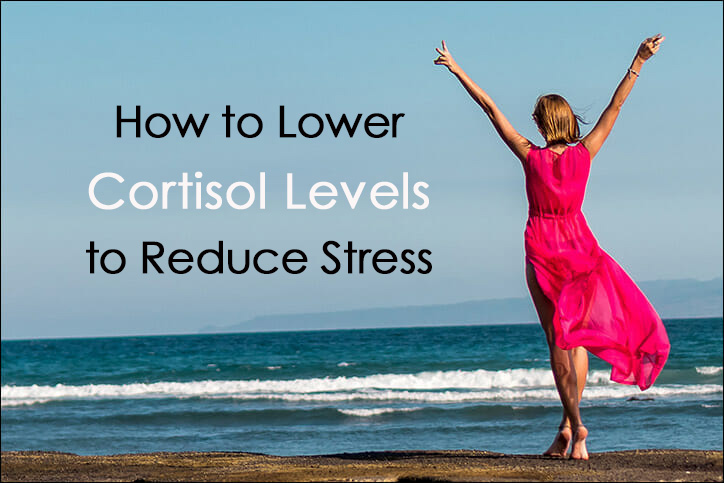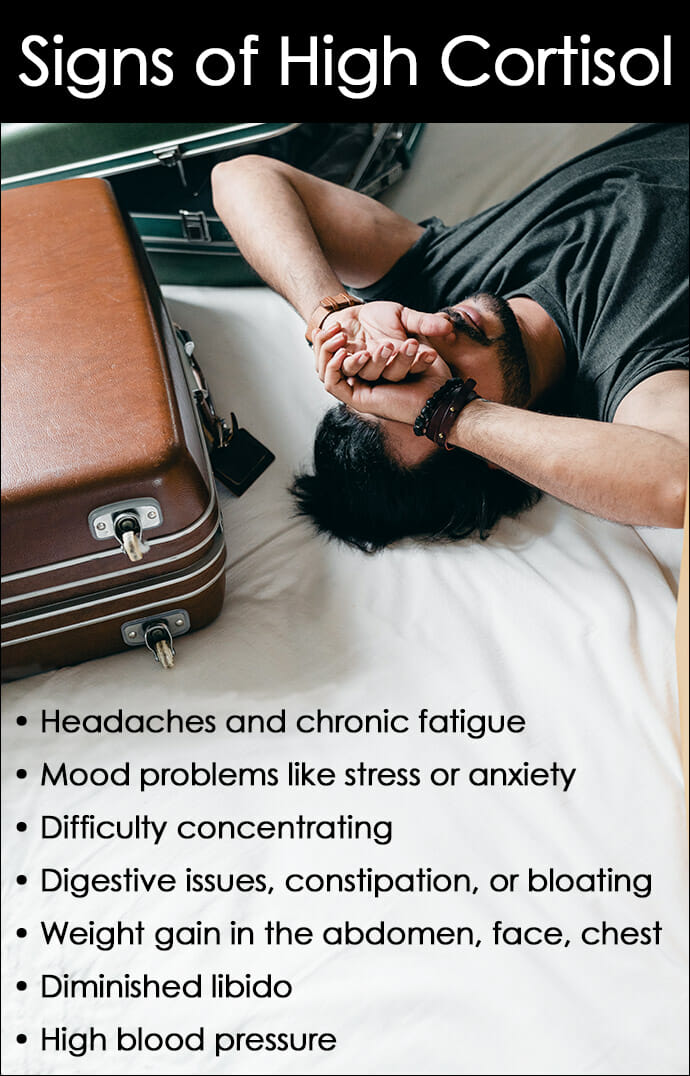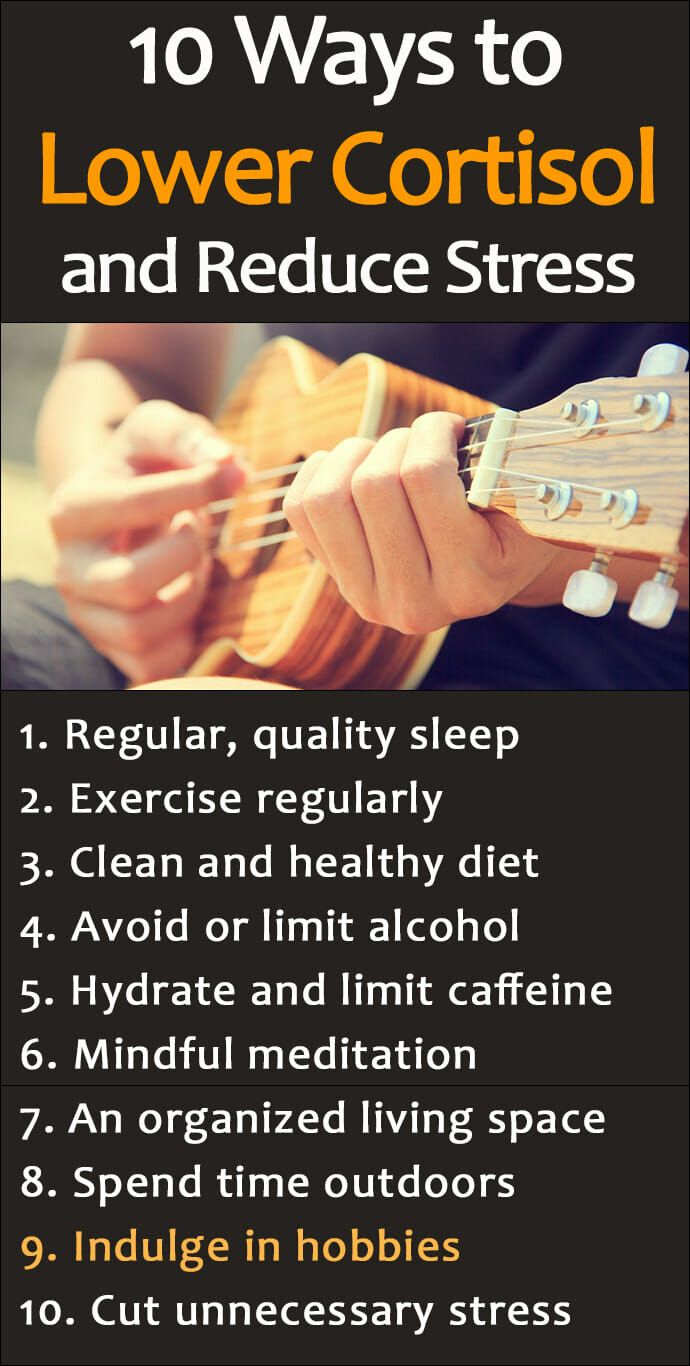Table of Contents
Learning how to lower cortisol levels to reduce stress can be beneficial for everyone, although most of us are not aware how easy this can be accomplished by following some simple techniques.
Stress is a normal part of life. It can occur due to a number of reasons, from professional or personal experiences to psychological or traumatic ones.
Everyone deals with the nagging pressure of stress from time to time and sometimes it passes quickly.
Understanding how to reduce cortisol to minimize stress can be an effective way to lessen the impact that it has on our daily life.
What is Cortisol?
Cortisol is a glucocorticoid hormone produced by the body’s adrenal glands and is often referred to as the “stress hormone.”
Glucocorticoids are a type of steroid hormone that suppress inflammation in the body’s tissues, as well as play an important function in metabolism, such as blood sugar levels, controlling blood pressure, and getting proper sleep.
Cortisol affects nearly every organ in the body and it plays a big role in regulating the body’s response to stress.
In the brain, cortisol can affect mood, desire and worry. In life-or-death situations, whether real or perceived, it can trigger the stress response of the body’s “fight or flight” mechanism, which helps people quickly make decisions and act in times of crisis.
High vs. Lower Cortisol Levels
The amount of cortisol in the body generally peaks in the early morning and decreases as the day goes on.
Abnormally high levels of cortisol in the body can be caused by some steroid medications or underlying health issues.
Chronic or toxic stress can also be a factor that causes unusually high levels of cortisol.
In a state of constant stress, cortisol levels remain elevated and are one of the major causes of anxiety.
High levels can also lead to problems with depression, sleep disturbances, and other mental health issues.
These types of problems are a reason why many people turn to alcohol or drugs to self-medicate their symptoms, which can lead to substance use disorders and the need for treatment.
Learning how to reduce cortisol levels naturally is a much healthier response than turning to substances to deal with stress and anxiety.
Signs of High Cortisol
Staying in a state of high stress is both physically and mentally unhealthy.
Sometimes it’s nearly impossible to avoid, like being in a highly stressful work environment, and it may be necessary for some people to seek low stress jobs as the only way out.
Understanding the signs of high cortisol levels can be important for knowing when to slow down and address the problems in our life that lead to chronic stress.
Some of the signs of high cortisol levels can include:
- Tension headaches, chronic fatigue, and struggling to recover from physical activity
- Mood problems, such as irritability, depression, or anxiety
- Difficulty concentrating
- Digestive issues, including constipation, diarrhea, or bloating
- Weight gain, particularly in the abdomen, face, and chest
- Diminished libido
- High blood pressure
In rare cases, high cortisol can be related to underlying health issues like Cushing’s Disease. So, it’s important to see a physician if unusually high levels of cortisol are indicated from blood, urine, or saliva samples.
Knowing how to naturally lower cortisol levels is extremely useful for improving overall wellbeing and living a happier life.
How to Reduce Cortisol Levels Naturally
To reduce cortisol levels naturally, there’s no real magic trick. It is about practicing a more sustainable, mindful, and healthy lifestyle.
This will not only reduce cortisol but also improve many other areas of daily living.
Some people find relief with anti-anxiety medication, but holistic and natural ways are much more sustainable without negative side effects.
10 Ways to Lower Cortisol Levels Naturally
1. Get regular, quality sleep
Quality sleep is essential for good health and maintaining proper cortisol levels. While it may seem odd, it’s necessary to create a regular sleep schedule and stick to it, even on the weekends.
Most people need anywhere from 6 to 9 hours of quality sleep every night.
2. Exercise regularly
It can be hard to prioritize regular exercise, but the benefits far outweigh the amount of time it takes to make it happen.
Exercising for as little as 30 minutes a day can help reduce stress and cortisol levels. For others, vigorous exercise a few times a week is all that’s needed.
What’s most important is slowly starting a new exercise routine to allow the body to adjust. Stamina, hormone, and stress levels will all improve over time.
3. Eat a clean, healthy, anti-inflammatory diet
Maintaining a healthy diet of lean proteins, fresh vegetables and fruits is an excellent way to reduce cortisol. These are foods that help the body sustain exercise and recover from workouts.
Avoiding sweets, saturated fats, and processed foods keeps inflammation and blood sugar spikes low, which can affect stress and mood.
Many of the same foods that boost serotonin also lower cortisol levels with the same effect of minimizing stress and anxiety.
4. Avoid or limit alcohol
It’s always a good idea to limit alcohol because it is a depressant, despite how a glass of wine or two makes us feel at the start.
Alcohol also disrupts sleep, which is a necessity for good health and lower stress levels.
The other problem with alcohol is that it can be habit forming. People may begin to rely on it as a coping mechanism to relieve stress, but it will have the opposite effect over time.
5. Stay hydrated and limit caffeine intake
Drinking plenty of water and avoiding too much caffeine, whether in coffee, sodas, or tea, allows for fewer spikes in energy, improved digestion, and better sleep. All of these are linked to lower stress and better health.
6. Practice mindful meditation
Learning to relax the mind and body through mindful meditation to reduce cortisol levels in the blood is also incredibly powerful for managing mood and perspective.
This can be as simple as finding a quiet spot to sit down, closing your eyes and focusing on your breathing for 10 to 15 minutes a day.
7. Keep a clean and well-organized living space
This might seem like a simple suggestion, but unnecessary clutter, even if it’s hidden away, can lead to a nagging feeling of disorganization, which can be stressful.
The result of taking a little bit of time to clean and organize cluttered spaces is not only satisfying, but it also leads to less stress and lower cortisol.
8. Spend time outdoors
Whether it’s a bike ride, walking, hiking, gardening or simply sitting on the porch and reading a book, spending time outdoors is a good way to get a boost of vitamin D to reduce cortisol, while letting life’s stressors fall away.
9. Indulge in hobbies
Learning new and creative activities or indulging in hobbies is an excellent way to focus on something other than life’s problems.
Hobbies can be anything, from learning how to paint, to fixing bicycles, playing a musical instrument, or collecting something unique.
It’s also good to continue finding new hobbies, if a previous one becomes uninteresting. It’s important to keep discovering things that spark our interest, even if they are fleeting.
10. Cut unnecessary stress from your life
It’s sometimes surprising how much stress we invite into our lives. It may be that we overschedule ourselves or take on too many unnecessary duties.
In other cases, we might hold on to a toxic relationship, whether it is with family or friends, that brings unneeded drama and stress to our existence.
To reduce cortisol, find ways to limit or cutoff activities or relationships that create too much stress. It might be hard at first, but the reward is a happier, healthier, and more productive life.
Frequently Asked Questions
How long does it take to lower cortisol levels?
The time it takes to lower cortisol will vary depending on the type of stress or other issues that caused elevated levels.
Cortisol from acute stress is temporary and usually increases and decreases quite quickly within a few hours.
Chronic stress may elevate cortisol for weeks or longer and may not return to normal levels until the cause has been treated or managed.
Regular exercise, proper sleep, and practicing meditation or mindfulness techniques can all help keep levels in check.
How to lower cortisol fast?
Taking slow deep breaths, walking or jogging outside, meditating, and focusing on the words and music of a favorite song are techniques that calm the body and mind to quickly reduce cortisol.
What stops cortisol production?
Cortisol is produced in the adrenal glands, pituitary gland, and hypothalamus during a stress response and the body generally stops production on its own under normal conditions when the stressful event is over.
Certain health conditions like Cushing Syndrome may require medication to control the release of cortisol.
Learning stress reduction techniques and making lifestyle changes can reduce cortisol production for many people.
What is a good way to lower cortisol levels at night?
Getting restful and consistent sleep is necessary for maintaining proper cortisol levels.
Creating a relaxing routine each night before going to bed can help to fall asleep quickly and stay asleep longer. Here are some tips:
- Avoid caffeine at night
- Meditate or practice breathing techniques
- Take a warm bath or shower
- Read a book or write in a journal
- Drink chamomile tea or cherry juice
- Turn off phone and computer screens an hour before bed
What is the Cortisol Awakening Response?
The Cortisol Awakening Response occurs within the first hour of waking in the morning. During this time, cortisol levels increase naturally to help the body become alert and then decrease as the day goes on.
What is an effective way to reduce cortisol in the morning?
Effective techniques for reducing cortisol in the morning after waking include:
- Natural sunlight
- Meditation
- Deep breathing exercises
- Eating proteins, fruit, and whole grains
- Walking or stretching exercises
- Avoid caffeine for at least 45 minutes





